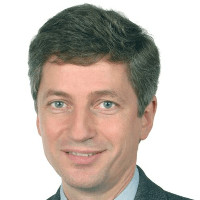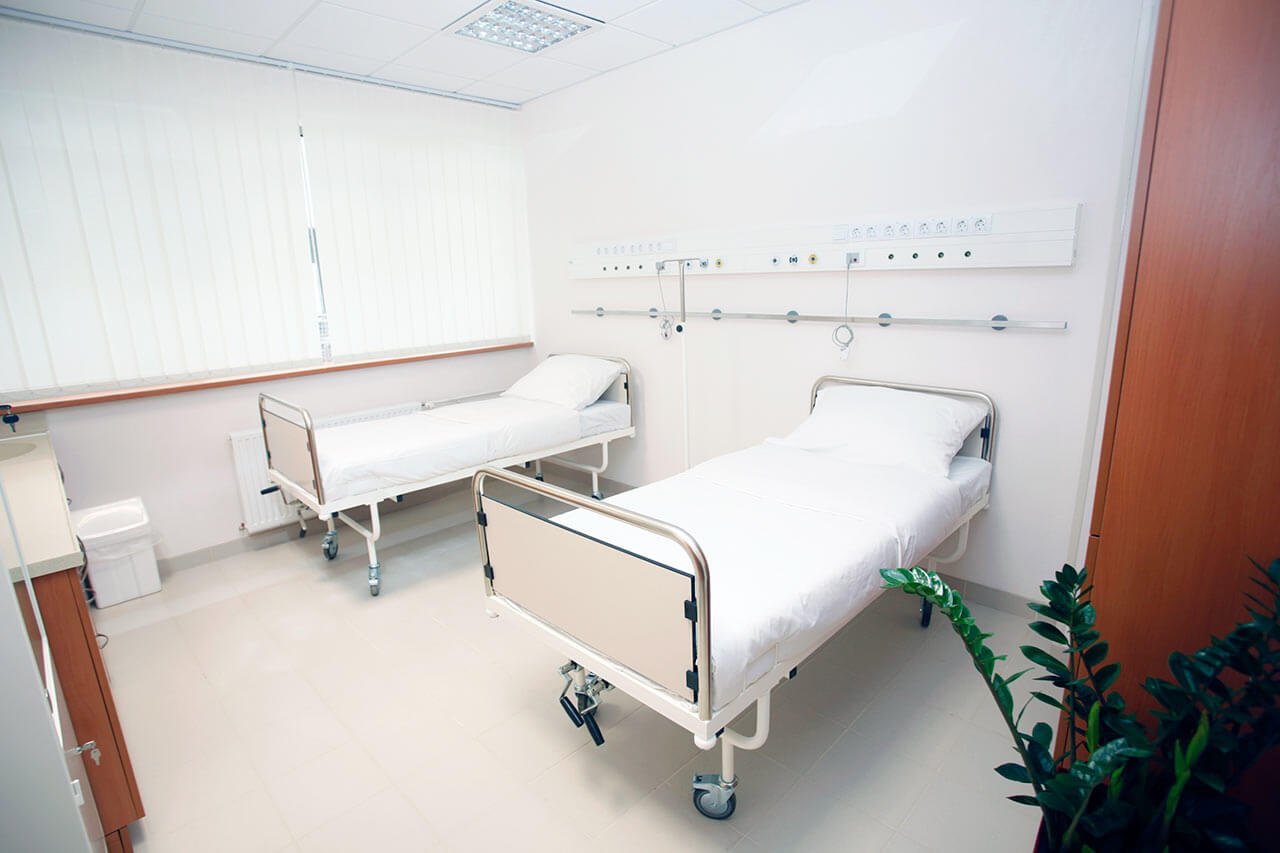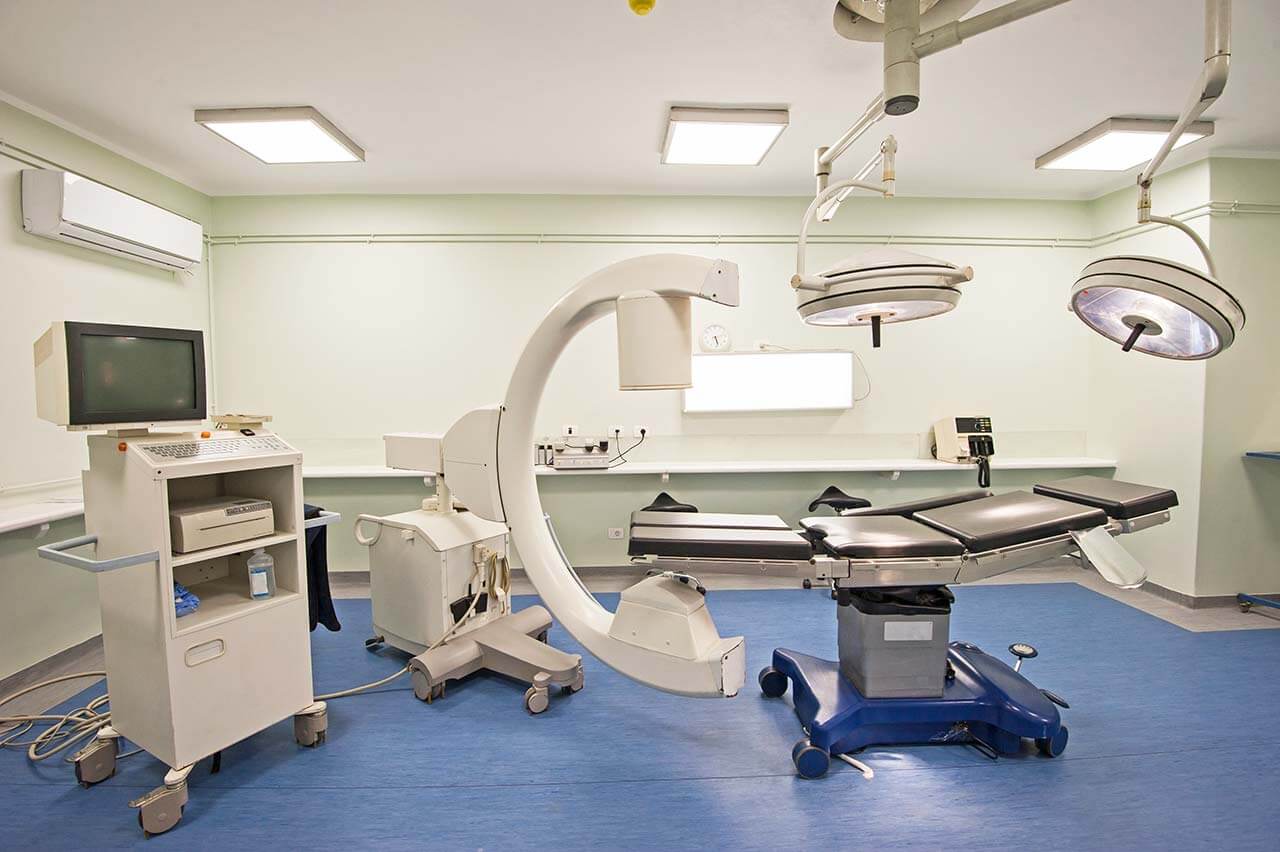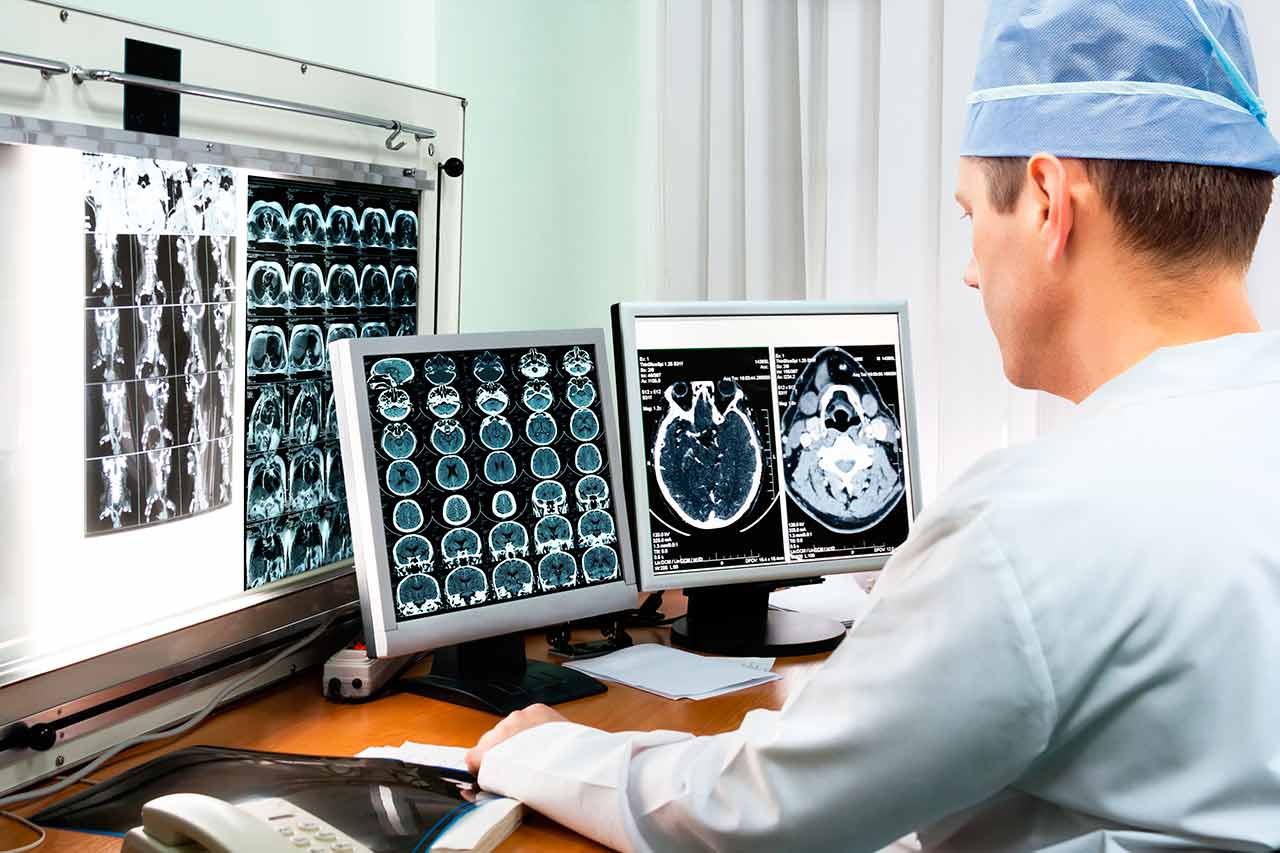
The program includes:
- Initial presentation in the clinic
- clinical history taking
- review of medical records
- physical examination
- laboratory tests:
- complete blood count
- biochemical analysis of blood
- thyroid function test (TSH-basal, fT3, fT4)
- mineral metabolism analysis (Na, K, Ca, Mg)
- lipid metabolism (HDL/LDL, cholesterol, triglycerides,
Lip(a), homocysteine) - iron content (ferritin, iron)
- blood coagulation analysis (aPTT, PT, INR)
- metabolic status (uric acid, total glucose, HbA1c)
- inflammatory parameters (CRP, ESR)
- cardiovascular disease risk markers
- lung function test (Spirometry)
- resting and exercise ECG
- holter monitoring (24h)
- color doppler echocardiography
- transesophageal echocardiography (tee)
- color doppler sonography of cerebral vessels
- preparation according to preoperative standard
- reconstruction of the septum and coronary bypass surgery (up to 2 wassels)
- symptomatic treatment
- control examinations
- the cost of essential medicines and materials
- nursing services
- full hospital accommodation
- explanation of future recommendations
- written statement
Required documents
- Medical records
- Echocardiography (if available)
Service
You may also book:
 BookingHealth Price from:
BookingHealth Price from:
About the department
The Department of Congenital and Acquired Heart Defects, Heart Valve Diseases at the University Hospital Muenster offers the full range of diagnostics, outpatient and inpatient treatment of these diseases. The department became the first Center of Excellence in Germany in the field of its specialization and annually treats a large number of native patients and patients from other countries of the world. The department has a wide range of diagnostic options, as well as doctors have vast experience in catheter interventions. The department is headed by Prof. Dr. med. Helmut Baumgartner.
The department's medical team makes every effort in order to provide the first-class medical care adapted to individual needs. At the same time, important attention is paid to the psychosocial support of patients. Thanks to a comprehensive approach to therapy aimed at the positive long-term result for each patient, the department regularly demonstrates high treatment success rates.
The treatment of patients who need heart surgery is carried out in close cooperation with the specialists of the Department of Cardiac Surgery. In this case, the department's cardiologists are responsible for the comprehensive diagnostics and subsequent care. In addition, the experts from the Department of Cardiology and Angiology are involved if required. Thus, the department offers patients the widest therapeutic options and the very latest treatment techniques, in particular catheter procedures, which are an excellent alternative to classical surgical interventions. Most minimally invasive procedures are performed under local anesthesia. The patient does not feel any pain and can be discharged from the hospital much faster. After the catheter procedure, the patient is also recommended to undergo regular follow-up examinations.
The department’s clinical focuses include:
- Diagnostic services
- Echocardiography
- Blood count
- 24-hour blood pressure monitoring
- Electrocardiography (including long-term ECG)
- Ergometry
- Spiroergometry
- Magnetic resonance imaging
- Multislice computed tomography
- Catheter diagnostics
- Treatment of simple and complex heart defects
- Simple heart defects
- Ventricular septal defect
- Atrial septal defect
- Atrioventricular septal defect
- Congenital heart valve diseases
- Stenoses that prevent normal blood flow (obstructive forms)
- Complex heart defects
- Transposition of the great vessels
- Tetralogy of Fallot
- Univentricular heart
- Simple heart defects
- Minimally invasive interventions
- Closure of the open oval window and atrial septal defect
- Balloon dilatation of heart valves (valvuloplasty)
- Dilatation in arterial and venous stenosis
- Balloon dilatation
- Stent implantation
- Catheter implantation of heart valves
- Other medical services
Curriculum vitae
- 1981 Doctor of Medicine, University of Vienna.
- Intern at the Sisters of Mercy Hospital, Linz and at the Sankt Pölten General Public Hospital.
- Medical specialist training for Internal Medicine, Department of Internal Medicine II at the Sisters of Mercy Hospital, Linz (Prof. Dr. Peter Kühn).
- Since 1990 Medical Specialist in Internal Medicine.
- 1989 - 1990 Fellowship, Department of Cardiology, Cedars-Sinai Medical Center, University of California, Los Angeles, USA (Dr. med. Gerald Maurer).
- 1991 Board certification in Cardiology (Prof. Dr. Peter Kühn).
- Until 1993 Senior Physician, Department of Cardiology at the Sisters of Mercy Hospital, Linz.
- 1993 Habilitation (Internal Medicine/Cardiology) at the University of Vienna.
- 1993 - 2007 Professional activities (University of Vienna, General Hospital):
- 1993 - 2007 Senior Physician at the Department of Cardiology (Department of Internal Medicine II), General Hospital Vienna.
- Extraordinary Professor for Internal Medicine/Cardiology at the Medical University of Vienna (until 2007).
- Head of the Program for Adolescents and Adults with Congenital and Acquired Heart Defects.
- 1994 - 1997 Establishment and management of the Outpatient Clinic for Hypertrophic Cardiomyopathy at the Department of Cardiology (including outpatient and inpatient treatment, non-invasive diagnostics, catheter interventions in these patients).
- 2005 - 2007 Participation in the intervention stand-by service of the department (coronary angiography and interventions, including acute interventions).
- Intermittent management of the Department of Cardiology.
- Head of the Research Group for Structural Heart Diseases (congenital and acquired heart defects, hypertrophic cardiomyopathy) at the Department of Cardiology.
- Head of the Research Group for Echocardiography including the Laboratory for In-Vitro Ultrasound for Experimental Research of the Department of Cardiology.
- Organizational tasks at the department (including personnel ones).
- 1993 - 2001 Head of the Laboratory at the Department of Cardiology.
- Teaching at the Medical University of Vienna (including the main lecture on Cardiology in the new curriculum).
- Since 11.2007 Head of the Department of Congenital and Acquired Heart Defects, Heart Valve Diseases at the University Hospital Muenster.
- Since 01.11. 2007 W3 Professor for Cardiology (Congenital Heart Defects in Adults – Cardiology, University of Muenster.
Research Interests
- Experimental and clinical investigations in the field of cardiac ultrasound (special focus on heart defects).
- Clinical investigations in the field of congenital and acquired heart defects (including natural course, postoperative long-term course, prognosis indicators, determination of the optimal time of operation for various heart defects, etc.)
- Catheter interventions in the treatment of congenital and acquired heart defects.
- Myocardial vitality.
Publications
- 147 publications, 90 of them in peer-reviewed journals (cumulative impact factor 377,255), 58 of them as first or senior author (cumulative impact factor 262,430), 201 published abstracts.
Prizes
- 12 Research Awards (11x as first or senior author, 10-fold Austrian Cardiologist Award).
Membership in Professional Societies
- Fellow of the American College of Cardiology (FACC).
- Fellow of the European Society of Cardiology (FESC).
- 2005 - 2007 President of the Austrian Society of Cardiology.
- 2006 - 2009 Board Member of the European Society of Cardiology.
- Board Member of the Working Group on Congenital Heart Diseases in Adults of the European Society of Cardiology (Co-Chairman 2004 - 2006, Chairman 2006 - 2008).
- Representative of Austria in the International Society for Adult Congenital Cardiac Diseases (since 2007 Executive Committee Member).
- Board Member of the Working Groups for Congenital Heart Defects (Founding Member) and Echocardiography of the Austrian Society of Cardiology.
- Member of Committees and Task Forces of the European Society of Cardiology (Practice Guidelines on the Management of Heart Valve Diseases, Accreditation, Education and Research Grants), German Society of Cardiology (Guidelines for Acquired Valve Defects, Guidelines for Adults with Congenital Heart Diseases) and the Austrian Society of Cardiology (importance of coronary CT, comprehensive optimization of myocardial infarction therapy, catheter intervention in structural heart diseases, creation and processing of examinations).
- Chairman of the Task Force of the European Society of Cardiology on the development of the ESC guidelines on the management of congenital heart diseases in adults (since 2008).
- Chairman of the Task Force of the American Society of Echocardiography and European Association of Echocardiography (European Society of Cardiology) for the creation of recommendations for the assessment of valvular stenosis.
- Member of the Ethics Committee of the Medical University of Vienna (until 2007).
- Editorial Board Member, European Journal of Echocardiography, Journal Cardiology.
- Regular Reviewer for top journals and annual conferences of the American College of Cardiology, European Society of Cardiology, EuroEcho and the Austrian Cardiology Society.
Photo of the doctor: (c) Universitätsklinikum Münster
About hospital
According to the Focus magazine, the University Hospital Muenster ranks among the top German hospitals!
The hospital belongs to the most prestigious medical institutions in Germany. The hospital is distinguished by a high professionalism of its doctors, state-of-the-art technological equipment and the availability of the most advanced diagnostic and therapeutic capabilities ensuring the first-class medical services. The hospital integrates more than 30 specialized departments, as well as numerous institutes and centers, thus representing all the specialties of modern medicine. The hospital treats more than 64,000 inpatients and 500,000 outpatients every year, which is an indisputable evidence of the highest quality of medical services.
The medical team of the hospital, consisting of more than 10,000 employers, is committed to preserving the physical health of patients, providing them with psychological support and compassionate attitude throughout the entire therapeutic process.
The hospital has succeeded in all specialties of medicine, however, main areas of its specialization include oncology, treatment of cardiovascular, neurological diseases, transplant medicine, psychiatry and psychosomatics, pediatrics with a special focus on rare diseases in children, traumatology, orthopedics, prenatal medicine, and reproductive medicine. In addition, key importance is given to scientific research and training of medical students, so that the specialists of the hospital make a momentous contribution to the development of medicine as a whole.
Photo: (с) depositphotos
Accommodation in hospital
Patients rooms
The patients of the University Hospital Muenster live in single or double rooms. The rooms are made in bright colors and modern design. Each room has an ensuite bathroom with shower and toilet. The standard room includes an automatically adjustable bed, a bedside table, a table and chairs for receiving visitors, a telephone and a TV. The hospital offers access to the Internet. If desired, the patient can also stay in the enhanced-comfort room.
Meals and Menus
The patients of the hospital are offered a tasty and balanced three meals a day: breakfast, lunch and dinner. The menu always features diet and vegetarian dishes. If for any reason you do not eat all the food, you will be provided with an individual menu. Please inform the medical staff about your dietary preferences prior to the treatment.
Further details
Standard rooms include:
Religion
Religious services are available upon request.
Accompanying person
During the inpatient program, an accompanying person may stay with you in a room or at the hotel of your choice.
Hotel
During the outpatient program, you can live at a hotel of your choice. Managers will help you to choose the most suitable options.
The hospital offers a full range of laboratory tests (general, hormonal, tests for infections, antibodies, tumor markers, etc.), genetic tests, various modifications of ultrasound scans, CT scans, MRI and PET / CT, angiography, myelography, biopsy and other examinations. Treatment with medications, endoscopic and robotic operations, stereotaxic interventions is carried out here, modern types of radiation therapy are also used. The hospital offers patients all the necessary therapeutic techniques.
- Stereotactic radiotherapy, including intracranial one
- Thulium and holmium laser enucleation of the prostate
- HIPEC for peritoneal cancer
- Imlantation of mechanical heart support systems
- Assisted reproductive technologies
These are arthrosis and sports injuries of the joints, benign neoplasms and malignant tumors of various localizations, spinal injuries, osteoporosis, benign prostatic hyperplasia, urolithiasis, inflammatory bowel disease and other pathologies.
- Traumatology and hand surgery
- Urology
- General and abdominal surgery
- Cardiology and cardiac surgery
- Obstetrics and gynecology
The hospital's team consists of more than 10,000 highly qualified employees.






